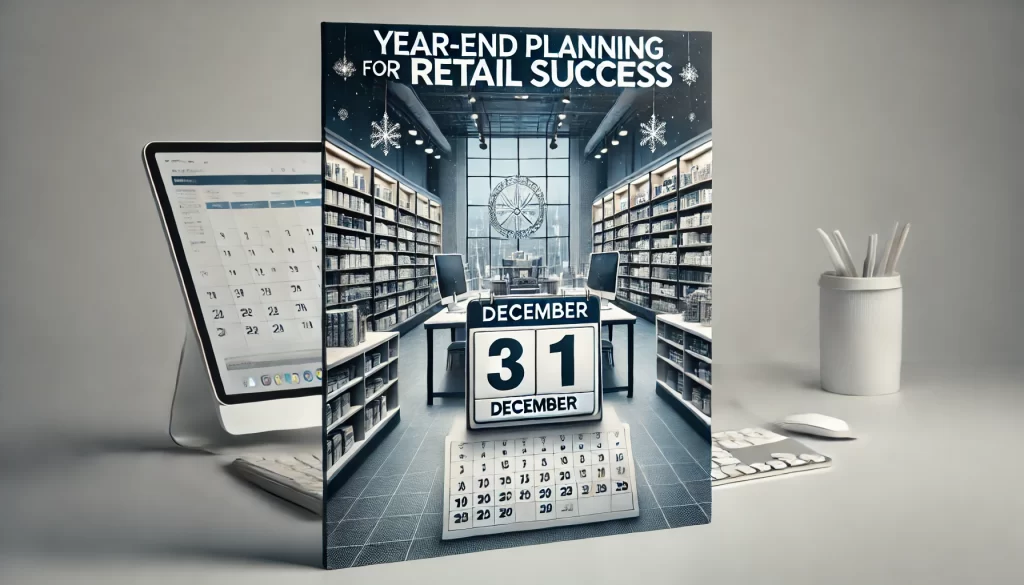The end of the year is a time of reflection, strategy, and preparation. For retailers, this period offers a unique opportunity to analyze performance, set new goals, and adjust strategies to ensure success in the coming year. Year-end planning is not just a task—it’s an investment in your business’s future.
Assessing This Year’s Performance
Before planning for next year, it’s essential to review how your business performed this year. Use these key metrics to guide your analysis:
- Sales Data: Identify trends and peak periods. What worked well? What underperformed?
- Customer Feedback: Analyze reviews and direct feedback to uncover areas for improvement.
- Inventory Management: Look for overstock or out-of-stock patterns that impacted your bottom line.
By pinpointing strengths and weaknesses, you can focus your efforts on what truly matters.
Building a Strategic Financial Plan
Financial stability is the backbone of any business. Consider these steps:
- Create a Budget: Allocate funds for marketing, inventory, staffing, and unexpected expenses.
- Review Vendor Contracts: Ensure you’re getting the best deals, and renegotiate where necessary.
- Plan for Tax Season: Organize receipts, expenses, and reports to streamline tax preparation.
Proactive financial planning can save you time and stress, setting the stage for a strong start to the new year.
Setting Clear Goals for the New Year
Well-defined goals act as a roadmap for success. Use the SMART framework to guide your planning:
- Specific: Set precise objectives, like increasing sales by 15% or expanding your product range.
- Measurable: Define metrics to track progress.
- Achievable: Be realistic while challenging yourself.
- Relevant: Focus on goals that align with your business vision.
- Timely: Establish deadlines to keep your team on track.
Preparing for Seasonal Trends
Retail thrives on seasonality. By understanding the trends that influence customer behavior, you can:
- Stock Up Early: Avoid supply chain disruptions by ordering inventory ahead of peak demand.
- Plan Promotions: Use historical data to schedule sales that attract the most customers.
- Update Displays: Refresh store layouts to capture attention and drive impulse purchases.
Evaluating Team Performance
Your team is a critical component of your success. Take time to:
- Recognize Achievements: Celebrate milestones and individual contributions.
- Address Challenges: Identify areas where additional training or resources are needed.
- Plan Staffing Needs: Adjust schedules and roles based on past performance and future goals.
A motivated and prepared team is more likely to deliver exceptional results.
Leveraging Technology for Growth
Incorporating technology into your operations can streamline processes and boost efficiency:
- Analytics Tools: Track sales trends, customer preferences, and marketing performance.
- Inventory Management Software: Automate stock tracking to reduce errors.
- E-commerce Platforms: Enhance your online presence to reach a broader audience.
Communicating with Your Customers
Your customers should be part of your year-end planning. Use this opportunity to strengthen relationships:
- Thank Them: Send personalized emails or offer loyalty rewards to show appreciation.
- Gather Feedback: Conduct surveys to understand their needs and preferences.
- Share Your Vision: Highlight your plans for the new year to build excitement and trust.
Retail success doesn’t happen by accident—it’s the result of thoughtful preparation and execution. Year-end planning ensures you start the next year with clarity, confidence, and a competitive edge. It’s not just about closing out this year; it’s about setting your business up for sustained growth.
Take the time to plan and watch your efforts pay off throughout the year.

